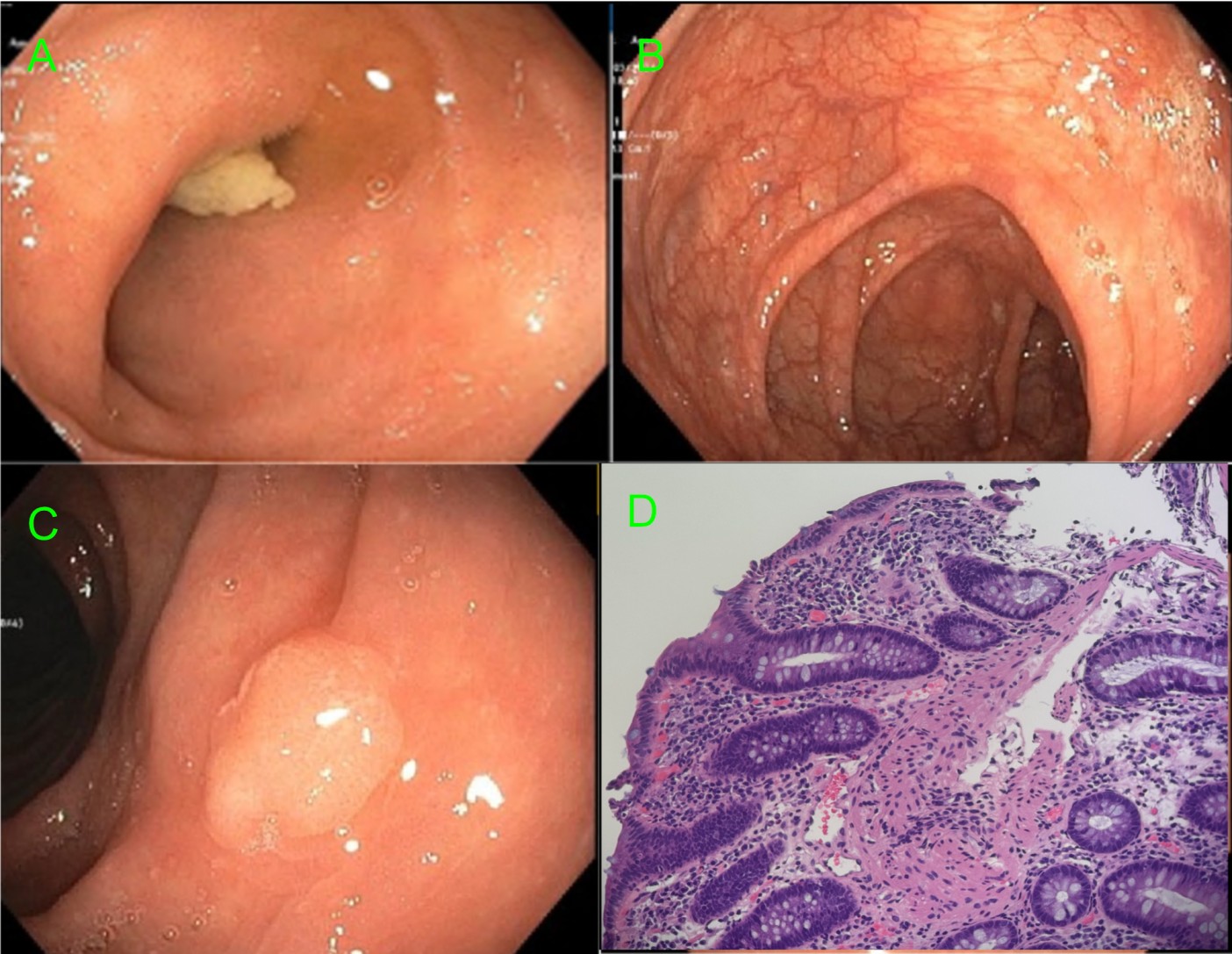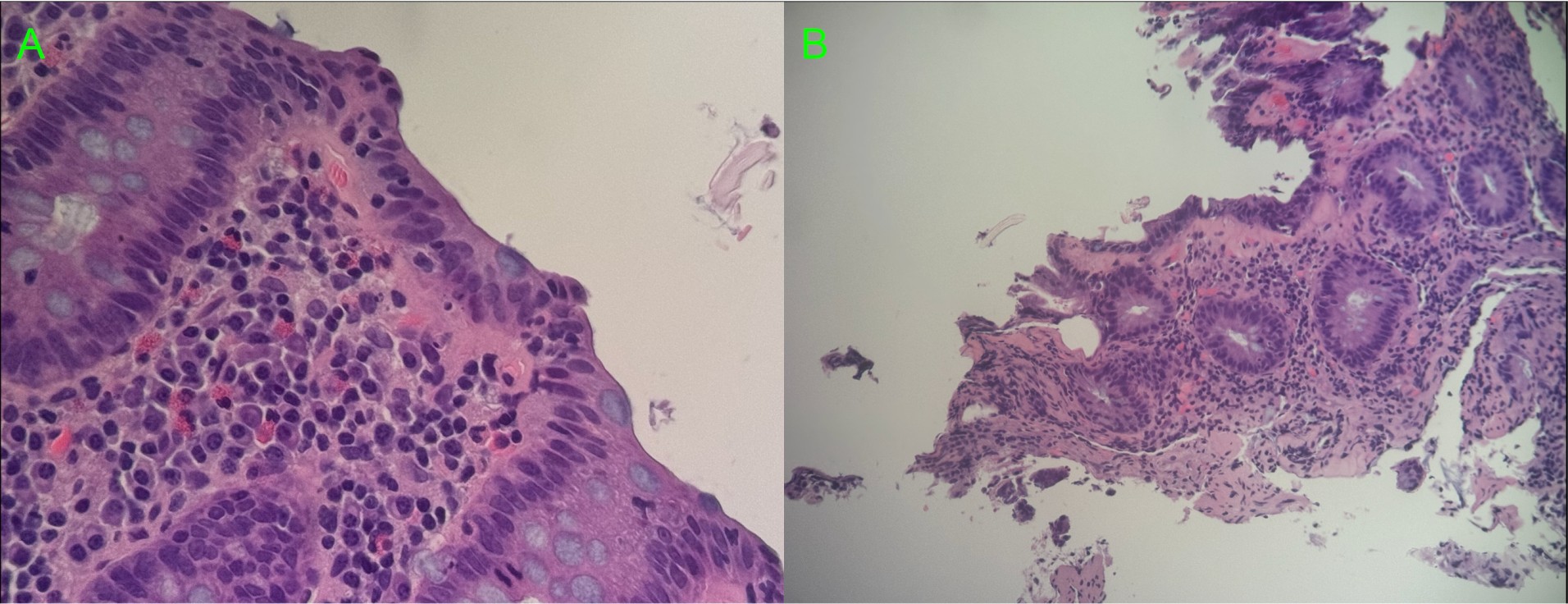Sunday Poster Session
Category: Colon
P0431 - Management of Collagenous Colitis With Upadacitinib: Overcoming Diagnostic and Therapeutic Challenges
Sunday, October 26, 2025
3:30 PM - 7:00 PM PDT
Location: Exhibit Hall
- QA
Qusai Almasad, MD
Roger Williams Medical Center
Providence, RI
Presenting Author(s)
Qusai AlMasad, MD1, Paola Pena, MD1, Dina Sinokrot, MD1, Nabil Toubia, MD, MPH2
1Roger Williams Medical Center, Providence, RI; 2Roger Williams Medical center, Providence, RI
Introduction: Collagenous colitis, a subtype of microscopic colitis, is characterized by chronic, non-bloody diarrhea and histopathologic evidence of a thickened subepithelial collagen band. While first-line therapy typically involves budesonide, a subset of patients experience persistent symptoms despite escalation to immunosuppressive and biologic agents. There is a paucity of data guiding management in refractory cases, particularly in young adults with longstanding disease. This case describes a 34-year-old male with a history of refractory collagenous colitis since adolescence, who achieved complete symptom resolution and mucosal healing following off-label upadacitinib therapy.
Case Description/
Methods: A 34-year-old male presented with gastrointestinal symptoms. In 2019, a colonoscopy with biopsies revealed multiple fragments of colonic mucosa with lymphoplasmacytic inflammation, intraepithelial lymphocytosis, and thickening of the subepithelial collagen plate, consistent with collagenous colitis. Since then, the patient has experienced ongoing difficulties in managing his condition. a repeat colonoscopy in 2021 showed non specific colitis. Initial treatments included adalimumab, azathioprine, and vedolizumab, which provided minimal symptom relief and did not result in complete healing. Prednisone was temporarily effective, but long-term use was not feasible due to potential side effects.
Due to the lack of sustained response to these treatments, off-label therapy with Upadacitinib was initiated. The patient responded well, with complete resolution of symptoms following the new therapy. A repeat colonoscopy four months later confirmed complete healing of the collagenous colitis, with pathology showing normal colonic mucosa and no longer identifying features of collagenous colitis.
Discussion: this case highlights the therapeutic and diagnostic challenges of refractory collagenous colitis. provides preliminary evidence supporting the potential utility of upadacitinib in this setting. The use of upadacitinib in microscopic colitis is off-label, and there are no published clinical trials or case series specifically addressing its efficacy in this population. However, the pathophysiological overlap between microscopic colitis and IBD, particularly the role of dysregulated immune signaling, provides a rationale for JAK inhibition in refractory cases.
Further studies are needed to establish the efficacy, safety, and optimal positioning of JAK inhibitors in the management of microscopic colitis.

Figure: Figure 1:
Images A,B,C: Normal colonoscopy 4 months after initiating Upadacitinib
Image D: H&E, shows Normal colonic mucosa. Features of collagenous colitis no longer identified

Figure: Figure 2
Image A: H&E, shows intraepithelial lymphocytes
Image B: H&E, shows thickened collagen table
Disclosures:
Qusai AlMasad indicated no relevant financial relationships.
Paola Pena indicated no relevant financial relationships.
Dina Sinokrot indicated no relevant financial relationships.
Nabil Toubia indicated no relevant financial relationships.
Qusai AlMasad, MD1, Paola Pena, MD1, Dina Sinokrot, MD1, Nabil Toubia, MD, MPH2. P0431 - Management of Collagenous Colitis With Upadacitinib: Overcoming Diagnostic and Therapeutic Challenges, ACG 2025 Annual Scientific Meeting Abstracts. Phoenix, AZ: American College of Gastroenterology.
1Roger Williams Medical Center, Providence, RI; 2Roger Williams Medical center, Providence, RI
Introduction: Collagenous colitis, a subtype of microscopic colitis, is characterized by chronic, non-bloody diarrhea and histopathologic evidence of a thickened subepithelial collagen band. While first-line therapy typically involves budesonide, a subset of patients experience persistent symptoms despite escalation to immunosuppressive and biologic agents. There is a paucity of data guiding management in refractory cases, particularly in young adults with longstanding disease. This case describes a 34-year-old male with a history of refractory collagenous colitis since adolescence, who achieved complete symptom resolution and mucosal healing following off-label upadacitinib therapy.
Case Description/
Methods: A 34-year-old male presented with gastrointestinal symptoms. In 2019, a colonoscopy with biopsies revealed multiple fragments of colonic mucosa with lymphoplasmacytic inflammation, intraepithelial lymphocytosis, and thickening of the subepithelial collagen plate, consistent with collagenous colitis. Since then, the patient has experienced ongoing difficulties in managing his condition. a repeat colonoscopy in 2021 showed non specific colitis. Initial treatments included adalimumab, azathioprine, and vedolizumab, which provided minimal symptom relief and did not result in complete healing. Prednisone was temporarily effective, but long-term use was not feasible due to potential side effects.
Due to the lack of sustained response to these treatments, off-label therapy with Upadacitinib was initiated. The patient responded well, with complete resolution of symptoms following the new therapy. A repeat colonoscopy four months later confirmed complete healing of the collagenous colitis, with pathology showing normal colonic mucosa and no longer identifying features of collagenous colitis.
Discussion: this case highlights the therapeutic and diagnostic challenges of refractory collagenous colitis. provides preliminary evidence supporting the potential utility of upadacitinib in this setting. The use of upadacitinib in microscopic colitis is off-label, and there are no published clinical trials or case series specifically addressing its efficacy in this population. However, the pathophysiological overlap between microscopic colitis and IBD, particularly the role of dysregulated immune signaling, provides a rationale for JAK inhibition in refractory cases.
Further studies are needed to establish the efficacy, safety, and optimal positioning of JAK inhibitors in the management of microscopic colitis.

Figure: Figure 1:
Images A,B,C: Normal colonoscopy 4 months after initiating Upadacitinib
Image D: H&E, shows Normal colonic mucosa. Features of collagenous colitis no longer identified

Figure: Figure 2
Image A: H&E, shows intraepithelial lymphocytes
Image B: H&E, shows thickened collagen table
Disclosures:
Qusai AlMasad indicated no relevant financial relationships.
Paola Pena indicated no relevant financial relationships.
Dina Sinokrot indicated no relevant financial relationships.
Nabil Toubia indicated no relevant financial relationships.
Qusai AlMasad, MD1, Paola Pena, MD1, Dina Sinokrot, MD1, Nabil Toubia, MD, MPH2. P0431 - Management of Collagenous Colitis With Upadacitinib: Overcoming Diagnostic and Therapeutic Challenges, ACG 2025 Annual Scientific Meeting Abstracts. Phoenix, AZ: American College of Gastroenterology.
